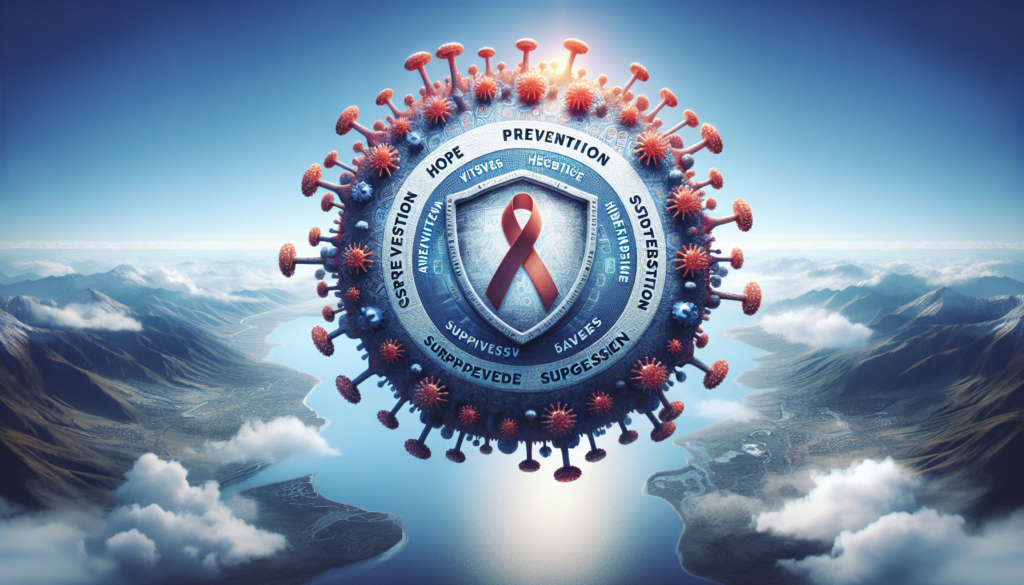Are you looking for an effective way to combat the transmission of HSV-2? Look no further than suppressive therapy. In this article, we will explore how suppressive therapy can greatly reduce the risk of HSV-2 transmission. Whether you’re living with the virus or concerned about your partner’s health, this treatment option offers hope and peace of mind. Join us as we delve into the ins and outs of suppressive therapy and discover how it can be a game-changer in preventing the spread of HSV-2.


What is suppressive therapy?
Definition
Suppressive therapy, also known as antiviral therapy, is a treatment approach for managing herpes simplex virus type 2 (HSV-2) infection. It involves the regular use of antiviral medications to reduce the frequency of outbreaks, lessen the severity of symptoms, and decrease the risk of transmission to others.
Purpose
The primary goal of suppressive therapy is to minimize the impact of HSV-2 infection on the individual’s physical and emotional well-being. By suppressing the replication of the virus, this therapy aims to reduce the frequency and severity of outbreaks, alleviate symptoms, and prevent the transmission of the herpes virus to sexual partners.
How it works
Suppressive therapy works by inhibiting the replication of the herpes simplex virus in the body. Antiviral medications, such as acyclovir, valacyclovir, and famciclovir, are commonly used to achieve this goal. These medications interfere with the ability of the virus to replicate and spread, ultimately reducing the viral load in the body. By keeping the virus in check, suppressive therapy helps prevent outbreaks and decreases the risk of transmission.
Understanding HSV-2 transmission
Introduction to HSV-2
HSV-2 is a sexually transmitted infection caused by the herpes simplex virus type 2. It is primarily transmitted through sexual contact, including vaginal, anal, and oral sex. HSV-2 infection can lead to the development of painful genital sores, flu-like symptoms, and recurrent outbreaks throughout a person’s lifetime.
Modes of transmission
The most common mode of transmission for HSV-2 is through sexual activity, particularly during vaginal or anal intercourse. The virus can also be transmitted through oral-genital contact, although the risk is generally lower. It is important to note that HSV-2 can still be spread even in the absence of visible symptoms or lesions, as the virus can be shed asymptomatically. Additionally, sharing sex toys or other intimate objects can also facilitate the transmission of the virus.
Risk factors for transmission
Several factors can increase the risk of transmitting HSV-2 to sexual partners. These include having multiple sexual partners, engaging in unprotected sex, having a weakened immune system, and having an active outbreak or recent history of outbreaks. It is crucial to be aware of these risk factors and take necessary precautions to prevent transmission.

Get 51% Discount If You Order Now!
Efficacy of suppressive therapy
Clinical trials and research
Numerous clinical trials and research studies have been conducted to evaluate the efficacy of suppressive therapy in managing HSV-2 infection. These studies consistently show that antiviral medications, when taken as prescribed, can significantly reduce the frequency of outbreaks and decrease the risk of transmission.
Reduction in transmission rates
Suppressive therapy has been shown to greatly reduce the risk of transmitting HSV-2 to sexual partners. Clinical trials have demonstrated a reduction in viral shedding, the process by which the virus is released and can potentially infect others. The risk of transmission is estimated to be reduced by up to 50% or more with regular use of suppressive therapy.
Effect on viral shedding
Suppressive therapy is highly effective in reducing viral shedding, which is the primary mechanism of HSV-2 transmission. By inhibiting the replication of the virus, antiviral medications help keep the virus dormant and reduce the amount of virus present in genital secretions. Lower levels of viral shedding translate to a decreased risk of transmitting the virus to sexual partners.


Benefits of suppressive therapy
Reduced frequency and severity of outbreaks
One of the key benefits of suppressive therapy is a significant reduction in the frequency and severity of outbreaks. Regular use of antiviral medications can help prevent or minimize the occurrence of painful genital sores and flu-like symptoms associated with HSV-2 infection. This can greatly improve the physical comfort and overall quality of life for individuals living with the condition.
Lower risk of transmission to partners
Suppressive therapy plays a crucial role in reducing the risk of transmitting HSV-2 to sexual partners. By consistently taking antiviral medications, individuals can significantly decrease the chances of viral shedding and the potential spread of the virus. This not only protects their partners from acquiring the infection but also promotes safer and healthier sexual relationships.
Improved quality of life
Suppressive therapy has been reported to have a positive impact on the psychological well-being of individuals living with HSV-2 infection. By minimizing the frequency and severity of outbreaks, suppressive therapy can reduce the physical discomfort and emotional distress associated with the condition. This, in turn, leads to an improved quality of life and a greater sense of control over the infection.
Considerations and precautions
Consultation with a healthcare provider
Before initiating suppressive therapy, it is essential to consult with a healthcare provider who specializes in sexually transmitted infections. They can provide personalized advice and recommendations based on your specific circumstances. They will also assess your medical history, discuss potential risks and benefits, and help determine the most appropriate antiviral medication and dosage for you.
Proper dosage and adherence
To maximize the effectiveness of suppressive therapy, it is crucial to take the prescribed medication exactly as directed by your healthcare provider. Adherence to the recommended dosage and frequency is vital for achieving optimal outcomes. Skipping doses or discontinuing the medication prematurely can compromise the effectiveness of the therapy and increase the risk of outbreaks and transmission.
Potential side effects
Like any medication, antiviral drugs used in suppressive therapy can have potential side effects. The most common side effects include headache, nausea, and abdominal pain. However, these side effects are generally mild and transient. It is important to discuss any concerns or adverse reactions with your healthcare provider, as they can provide guidance and recommend appropriate alternatives if needed.
Developments in suppressive therapy
Advancements in antiviral medications
Over the years, there have been advancements in the development of antiviral medications for suppressive therapy. Newer drugs, such as valacyclovir, have been introduced, offering improved bioavailability and more convenient dosing regimens. These advancements have enhanced the effectiveness and ease of use of suppressive therapy, further optimizing outcomes for individuals with HSV-2 infection.
Long-term safety and efficacy
Research has shown that suppressive therapy with antiviral medications is generally safe for long-term use. Studies evaluating the safety profiles of these medications have found minimal side effects and negligible risks associated with their prolonged use. This provides reassurance for individuals considering long-term suppressive therapy as a means of managing their HSV-2 infection.
Emerging alternative treatments
In addition to traditional antiviral medications, several emerging alternative treatments are being explored for the management of HSV-2 infection. These include novel antiviral agents, immune-based therapies, and therapeutic vaccines. While these approaches are still in the experimental stages, they hold promise for future advancements in suppressive therapy and may provide additional treatment options in the coming years.

Effectiveness in specific populations
Suppressive therapy in pregnant women
Pregnant women with HSV-2 infection face unique considerations and challenges. Suppressive therapy can be particularly beneficial for pregnant individuals, as it helps reduce the risk of transmission to the newborn during childbirth. It is crucial for pregnant individuals with HSV-2 to discuss their options with their healthcare provider and receive appropriate guidance and support throughout pregnancy.
Impact on transmission to newborns
HSV-2 infection can pose serious risks to newborns if acquired during childbirth. Suppressive therapy has shown to significantly reduce the chances of transmitting the virus to newborns. In cases where an active outbreak is present at the time of delivery, the healthcare provider may recommend antiviral treatment to further minimize the risk of transmission and protect the newborn.
Considerations for immunocompromised individuals
Immunocompromised individuals, such as those with HIV/AIDS or undergoing chemotherapy, may experience more severe and prolonged HSV-2 outbreaks. Suppressive therapy can help manage the infection in these individuals and prevent complications. However, it is crucial to closely monitor antiviral medication interactions and potential adverse effects in immunocompromised individuals due to their compromised immune system.
Cost and accessibility
Availability of antiviral medications
Antiviral medications commonly used in suppressive therapy, such as acyclovir, valacyclovir, and famciclovir, are widely available with a prescription. These medications can be obtained from pharmacies and healthcare providers, ensuring that individuals have access to the necessary treatment options for managing their HSV-2 infection.
Affordability and insurance coverage
The cost of antiviral medications for suppressive therapy can vary depending on factors such as brand, dosage, and insurance coverage. While these medications may be expensive without insurance, many healthcare plans cover the costs of these prescriptions. Furthermore, patient assistance programs and generic alternatives are available to help individuals access affordable antiviral medications.
Global access to suppressive therapy
In some regions, access to suppressive therapy for HSV-2 infection may be limited due to factors such as cost, availability, and healthcare infrastructure. Efforts are being made to improve global access to affordable antiviral medications and ensure that individuals worldwide have access to the necessary treatment options for managing their HSV-2 infection.
Lifestyle modifications
Safe sexual practices
While suppressive therapy can greatly reduce the risk of HSV-2 transmission, it is important to combine it with safe sexual practices. This includes using latex or polyurethane condoms consistently and correctly during every sexual encounter. It is also advisable to avoid sexual activity during outbreaks or when experiencing prodromal symptoms (tingling or itching sensations before an outbreak). These measures can provide an additional layer of protection for oneself and one’s sexual partner.
Disclosure and communication with partners
Open and honest communication with sexual partners about HSV-2 infection is crucial. It enables both parties to make informed decisions about sexual activities and take necessary precautions to prevent transmission. Disclosing one’s status before engaging in sexual activity fosters trust and mutual understanding in intimate relationships.
Psychological support and counseling
Living with HSV-2 infection can have a significant impact on an individual’s emotional well-being. It is important to seek psychological support and counseling if needed. Support groups and individual counseling sessions can provide a safe and understanding space to discuss concerns, address emotional challenges, and develop coping strategies to navigate the complexities of living with HSV-2.
Conclusion
Summary of suppressive therapy
Suppressive therapy is a valuable treatment approach for managing HSV-2 infection. Through regular use of antiviral medications, it effectively reduces the frequency and severity of outbreaks, minimizes viral shedding, and lowers the risk of transmitting the virus to sexual partners. This therapy provides numerous benefits, including improved quality of life and greater control over the infection.
Consideration of personal circumstances
The decision to initiate suppressive therapy should be based on individual circumstances, such as the frequency and impact of outbreaks, the desire to reduce transmission risks, and the potential benefits and risks of antiviral medications. Consulting with a healthcare provider who specializes in sexually transmitted infections can provide personalized guidance and support in making informed decisions.
Future research and advancements
Ongoing research and advancements in HSV-2 treatment and prevention continue to drive progress in suppressive therapy. Scientists are exploring new antiviral agents, therapeutic vaccines, and immune-based therapies to further enhance treatment options. As research advances, it is anticipated that more effective and accessible suppressive therapy approaches will become available, offering improved outcomes for individuals living with HSV-2 infection.



